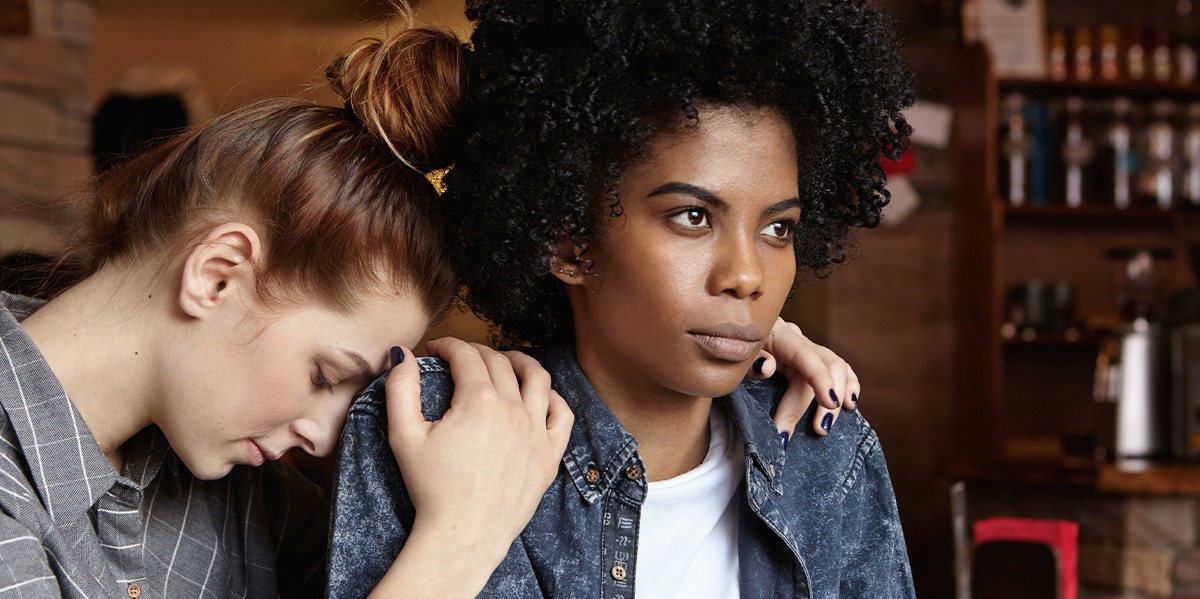Why The Hardest Conversation I Had About Race Was With My White Childhood Best Friend
It was something we needed to talk about.
 WAYHOME studio / Shutterstock
WAYHOME studio / Shutterstock The topic of race can be a difficult topic to speak about, and to hear — especially for Black people.
Since the uptick in protests that had happened over the summer in the wake of the George Floyd murder, I found myself having more and more conversations about race, with people across all demographics.
Mostly, I had these conversations with family members and close friends.
But, it was one person who I had a conversation about race with that really put things into perspective for me.
The conversation happened between me and best friend since middle school, who is probably one of the first and longest white friends I’ve ever had.
She had been very vocal on social media and in her own personal life when it came to confronting the topic of racism in the United States.
She had uncomfortable conversations with her own conversative family members.
She regularly challenged them to think outside of their normal and everyday thoughts when it came to the systems in place, and how they’ve worked against people of color for the last four hundred years.
RELATED: Racial Gaslighting: What Is It And Why We Need To Stop Doing It
All of this made it even more bewildering when she and I started having about the same kinds of conversations.
We had been sitting in my living room, one summer night in June, watching the news report on another protest that had happened in Downtown Brooklyn. Except, the media had twisted the story in favor of the police.
Angrily, I’d changed the channel, muttering something under my breath about how skewed these stories were, and my friend turned to me, confusion written all over her face and had asked: “Why did you change it?”
I remember blinking a few times at her, as if she hadn’t been watching the same thing I had been.
In a calmer tone, trying not to jump to any conclusions, I simply responded, “That’s not something I want to watch.”
And that began the first rift between us.
Having her as my friend had never been challenging before. We never disagreed on many things, at least when it came to race and racism.
And in the wake of the many Black Lives Matter protests, she and I were always on the same page with our thoughts.
Whenever I spoke, she listened with rapt attention, never inserting herself into what I was trying to say. She understood, and would sometimes go home and do her own research — which was why I was completely caught off guard with the next few things she said.
After voicing my discomfort with the clip the news was showing, she had rolled her eyes in a rather condescending manner, saying, “If you want to fix this system so badly, you can’t just tune it all out.”
My eyebrows had practically skyrocketed to my hairline. Since when has this ever been my problem?
Speaking the question out-loud, she seemed stumped. Her silence was practically deafening as she very clearly thought about my question.
“So then, what are we [white people] supposed to do? How do we fix it?”
The question was full of frustration coming from her mouth, full of exasperation and tiredness. And it made me angry almost instantly.
Because I don’t know.
Because over four centuries ago, white people decided that Black and Brown people were sub-human. And whether my friend realized or not, all white people, even the ones at the protests, even the ones waving the Black Lives Matter flags around, even the ones who voted out Trump, benefit from that decision.
It is not, and will never be, my responsibility to figure out how to break apart the system, because it isn’t my fault that the system is like this in the first place.
I’m too busy trying to figure out how to survive it.
RELATED: Why Black Lives Deserve More Than Just Superficial Activism
After explaining all of this to her, it seemed as if the lightbulb hadn’t gone off like any other time we’ve talked about subjects pertaining to race.
And it was then that I realized, for the first time in our ten years of friendship, just how different everything was quickly becoming.
Somehow I’d managed to delude myself into thinking she would understand — because she has me. And I’m her longest Black friend, so there’s absolutely no way she could ever have these thoughts because I’m around, right?
But it wasn’t right, and after I’d decided to leave the conversation, and we changed the channel to some random movie, I kept thinking back to it.
Even after she left to go home, and I went up to my room and laid in bed. My mind still kept going back to what she had said — her lingering question.
We’ve since talked more about it, and for the most part, she’s much more understanding of everything, but it still stands as a thought that many other white people may very well have.
Racism is a white problem that people of color happen to reap the consequences of.
White people made it. Whiteness crafted it, stoked it, and nursed it into the monster it has become.
Whiteness is the culprit, and therefore whiteness must find a way to change it, to fix it.
Nia Tipton is a writer living in Chicago. She covers pop culture, social justice issues, and trending topics. Follow her on Instagram.

